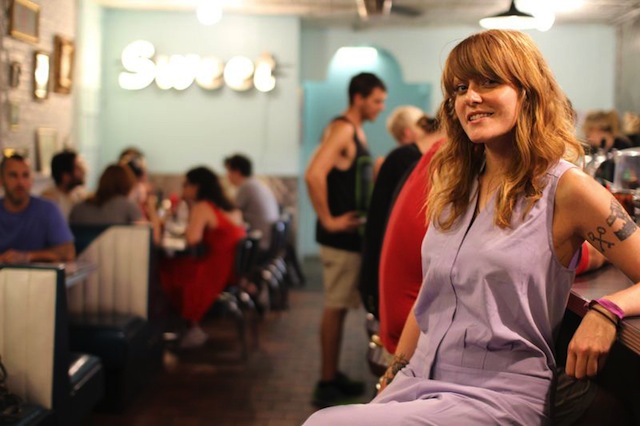
You’ve probably heard about us Brooklyn girls by now. We’re Hannah, working service industry jobs with our liberal arts degrees, blowing our tips on craft beers and new tattoos while our parents cover the rent. We’re one of the 2 Broke Girls, saving change from the diner shift and aspiring to a career selling cupcakes made out of the box. And now we’re one of the protagonists in a new book series, Brooklyn Girls, naive post-grads charming our way through each bad decision of our semi-adult lives. You can watch (and read) all you want, but none of those stories will tell you anything about Brooklyn girls—lowercase.
Even though we’re typecast on TV as adorable fuck-ups with no semblance of financial or personal responsibility (even though, as Yael Kohen pointed out, the writers who first created these marketable yet floundering female characters are themselves wildly successful) there are plenty of real-life young women in Brooklyn who are killing it, creatively and professionally. Here are five of them.
Morgan Greenseth, 28, co-owner of Champs Family Diner
Hometown: Wall, South Dakota
Current neighborhood: Carroll Gardens
Education: B.F.A. Art Institute of San Diego, Master of Interior and Living Design at Domus Academy in Milan, Italy
Moved to Brooklyn: Summer 2011 by way of Seattle
Hustle: Senior designer at David Mexico Design Group, co-owner of Champs Family Diner, co-owner of Mini Empire Bakery, co-author of two cookbooks Mini Pies and Petite Treats
Catch her: Watching movies in the backyard of Lavender Lake with her favorite drink, the Street King; running along Brooklyn Bridge Park; dancing at Gowanus Grove’s “Mister Sunday” after a day at Jacob Riis beach.
Greenseth knows a good idea will only get you so far. Luckily, she also has great follow-through. Her venture Mini Empire Bakery began as a collaboration with a friend, a creative side-project to make extra money during the recession while both were working full-time at a design firm. The mini desserts the two baked out of a co-op kitchen in Seattle quickly grew so popular they caught the attention of Ulysses Press, who published two cookbooks. Mini Pies and Petite Treats both landed a coveted spot in the Oscar gift bags this year, alongside luxury items like a $5,000 “vampire facelift.”
Riding that wave of success, Greenseth moved to Brooklyn in 2011, where she took an interest in Williamsburg vegan joint Champs Family Bakery and Diner. She collaborated with the owner Brad Baker to redesign the interior, transforming the ho-hum eatery into a full-on cozy diner that has turned into a neighborhood hot spot. She eventually bought into the business.
Unlike the stereotypical post-grad girl who comes to Brooklyn hoping to find life direction at the Levee at 3 am, she came to town with a plan.
“A friend told me when you move to New York, you should set your goals three times higher, because they can be achieved,” she says. She credits her work-ethic to her Midwestern upbringing in her 800-person South Dakota town. “My family is all hard workers, and they instilled those values in me. I’ve always had to work for what I have.”
Up next: Greenseth is currently organizing a conference, “Future of Places: Next Generation Place Makers” set for a weekend (TBA) in November in Brooklyn. Participants submit proposals for public space design projects, with one category focusing on post-Sandy development in the Rockaways. The $5 entry fee will go toward funding the winning proposals, which will be voted on at at public exhibition at the end of the conference.
Brooklyn women she admires: Artist and tattoo artist Amanda Wachob. Angela Giachetti, NYC marketing manager for Eventbrite and women’s activist. Aja Marsh, Briana Campbell and Joann Kim of job networking organization Work it Brooklyn.
Her advice to up-and-coming Brooklyn women: “Don’t just talk about what you want to do; do something to make it happen, no matter how small a step it is. Work hard, ask questions; be humble yet self-assured. Take a chance! You can’t move ahead without taking some risks.”
_________________
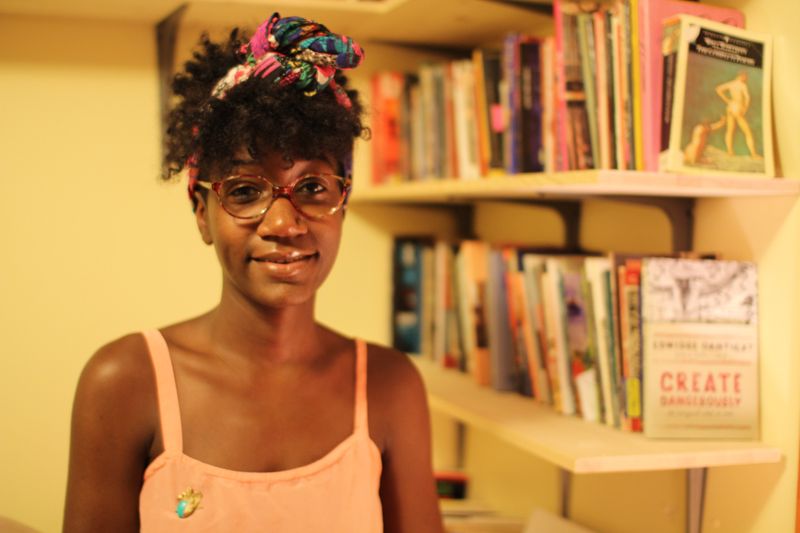
zakia henderson-brown, 28, poet and activist
Hometown: Bed-Stuy, Brooklyn
Current neighborhood: Crown Heights
Education: B.A. Wesleyan University, M.F.A. in Poetry and Literary Translation, Queens College
Moved (back) to Brooklyn: Summer 2006
Her hustle: Poet and activist; outreach coordinator for The New Jim Crow at The New Press
Catch her: Watching matinees on Tuesdays at Cobble Hill Cinema; shakin’ it at Bed-Stuy’s Voudou Bar; attending first Saturdays at the Brooklyn Museum
While Brooklyn is inundated with newcomers— and TV likes to dwell on those wide-eyed ingenues — zakia henderson-brown (that’s right, lowercase) was born and raised in Bed-Stuy and is proud of it.
“When I tell people I’m from here, they’re shocked because it’s so rare they actually meet anybody who grew up here,” she says. She’s started calling herself a “nativist” and a “loyalist” to distinguish herself from newbies.
“Over the past couple years, I’ve felt the need to assert that I’m actually from here. I would never live anywhere else in NYC. I’d leave the state before I left Brooklyn.”
She says the Brooklyn she grew up in “doesn’t exist anymore.” She’s seen folks she’s known all her life get displaced by rising rents, pushing them out to Brownsville and East New York.
But gentrification has its upsides — namely new people to meet, and new things to drink. “It’s really helpful dating-wise, since people from all over move here everyday,” she says. “Plus I’ve literally dated everyone in Brooklyn that I knew from home. It’s also nice to have access to things I never had access to before — I love how I can find any kind of beer I want. And now I don’t have to leave the hood to eat at a nice sit-down restaurant.”
henderson-brown is a bad-ass activist who has worked for the Malcom X Grassroots Movement, taking part in copwatch patrols in Bed-Stuy which monitor police conduct, among other drug policy reform and human rights work. Even her day job is rooted in activism: she works at The New Press as outreach coordinator for author Michelle Alexander’s best seller The New Jim Crow: Mass Incarceration in the Age of Colorblindness, connecting readers who want to organize actions inspired by the book.
In her poetry, henderson-brown strives to merge the political and the personal, writing poems that are “timely, but also timeless,” such as this one she wrote in the wake of the Trayvon Martin murder that imagines the perspective of George Zimmerman’s wife, Shellie. She’s been published in places such as Beloit Poetry Journal and the anthology Why I am Not a Painter, put out by Argos Books.
Up next: This fall, zakia will do a residency in poetry at the Vermont Studio Center.
Brooklyn women she admires: Photographer and educator Kameelah Rasheed. Anthonine Pierre, Community organizer at the Brooklyn Movement Center
Her advice to up-and-coming Brooklyn women: “Be intentional about building community here. Look out for your fellow women. Support the Brooklyn Public Library! Wear a helmet. Have a blast.”
_________________
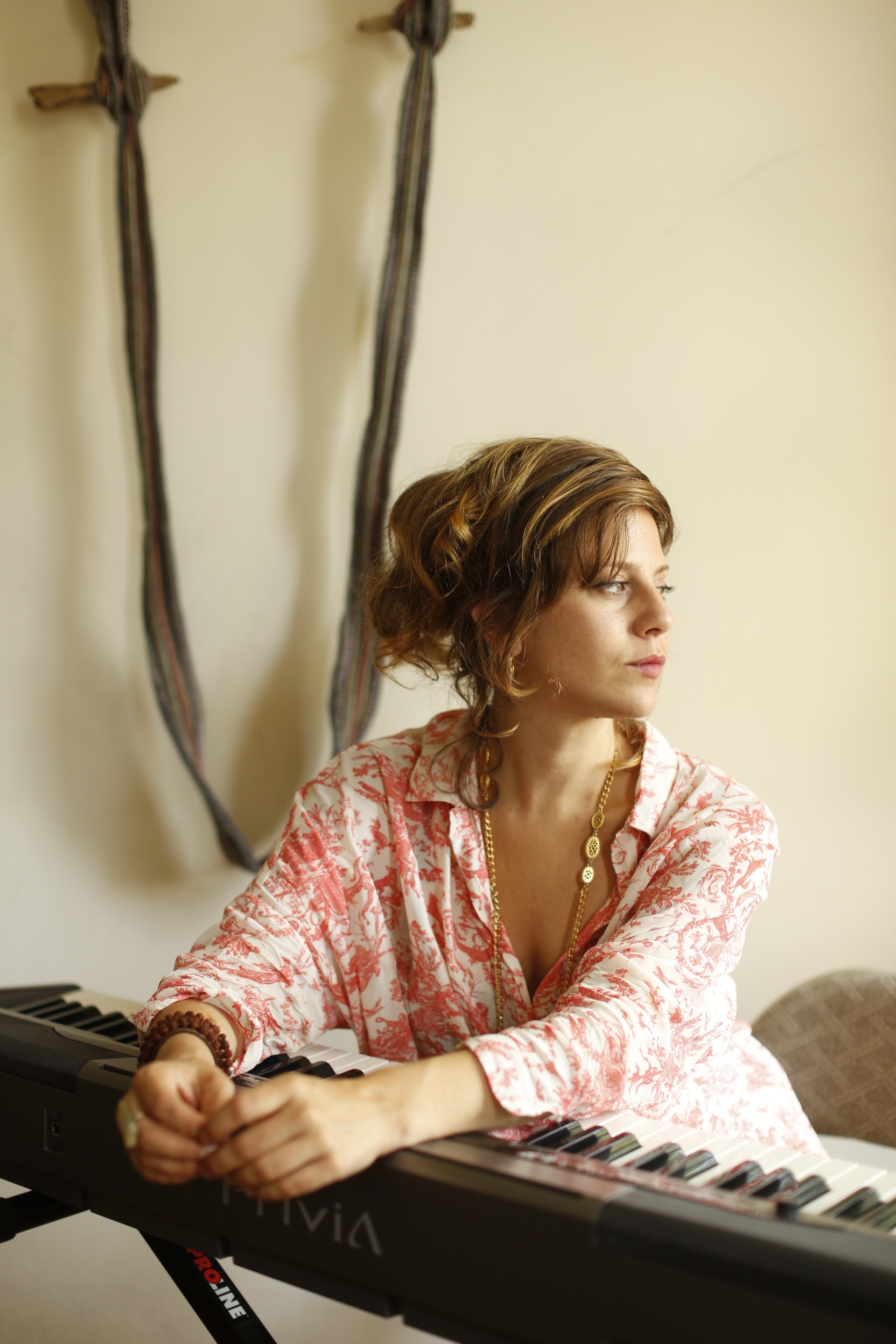
Sonia Kreitzer, 28, singer-songwriter
Hometown: Syracuse, New York
Current neighborhood: Ditmas Park
Education: B.A. in Studio Art (Painting), Oberlin College
Moved to Brooklyn: Summer 2007 by way of San Francisco
Her hustle: Singer, Doe Paoro
Catch her: Going to Brighton Beach and “staring at the ocean and speaking Russian and eating potato-filled things;” hanging at Ditmas Park local bar Sycamore; getting involved in Bushwick’s Bodii Actualized yoga and music community
Doe Paoro, Kreitzer’s stage name, sets her apart from any Brooklyn girl stereotype. It was inspired by a Maori creation myth in which Paoro, the God of Echo, gives voice to the first woman. “To me, the name signifies the importance for women to be able to recreate and rewrite their own myths,” she says.
She knows firsthand about personal transformation. Kreitzer had almost given up on her music career. She was waiting tables in Bushwick but after a big breakup and seeing her 10-piece soul band fizzle out, she fled Brooklyn to go to yoga school in India. But inspiration found her again while hiking the Himalayas: she heard a voice singing a kind of sound she had never heard before, and she followed it.
What she heard was lhamo or Tibetan Opera, a vocally-acrobatic, spiritual style that uses the body as instrument. The sound was so captivating she felt she had to learn how to make those sounds herself, and sought teachings from a master.
“It was unfortunate timing. Eat, Pray, Love the movie had just come out and my friends were making fun of me that I was that cliche. But really, my story just happened really organically the way it did. I feel like I stepped into its trap.”
While studying lhamo, she started singing melodies into a recorder, what would become her stripped down, emotionally-raw single, Can’t Leave You, mixed by music producer Lasse Marten (Peter Bjorn & John, Lykke Li).
After seven months of traveling alone in India, Greece and Egypt, she moved back to Brooklyn and began working with music producer Adam Rhodes, a friend from upstate New York, creating spare, evocative tracks. From that point on, everything fell into place: January 2012, Doe Paoro had her debut concert at Pianos; in February, released the album Slow to Love; and by that March, she was headed to South by Southwest. The single “Born Whole” best captures her haunting “ghost soul,” with a voice that drops to a gravelly hollow and then unleashes into a “feral wail”—her words.
She’s recorded songs for her second album in Stockholm with Marten, as well as Justin Vernon of Bon Iver. This spring she released two new singles on vinyl from White Iris Records, the trippy “New Lows” (video) and “See Me Now.”
Up next: Deciding which label to sign with for her second album.
Brooklyn women she admires: Solange (whom Doe Paoro opened for at Crossing Brooklyn Ferry), filmmaker and journalist Miranda Siegel, creative director of Various Love Affairs Anjia Jalac
Kreitzer thinks the trope of the irresponsible, waffling BK girl is a myth. “The bottom line is that any young woman who moves here is doing it for her professional life, because she’s hustling,” she says. “Otherwise, there is no other reason to live here when you could be much happier, live more cheaply and easily elsewhere.” She found recent NYC-based millenial tale Frances Ha relatable in that “the struggle of being an artist in the city is always there.”
Her advice to up-and-coming Brooklyn women: “Follow your heart, pay your rent on time and don’t forget to walk across bridges in this city because that’s a nice thing to do.”
_________________
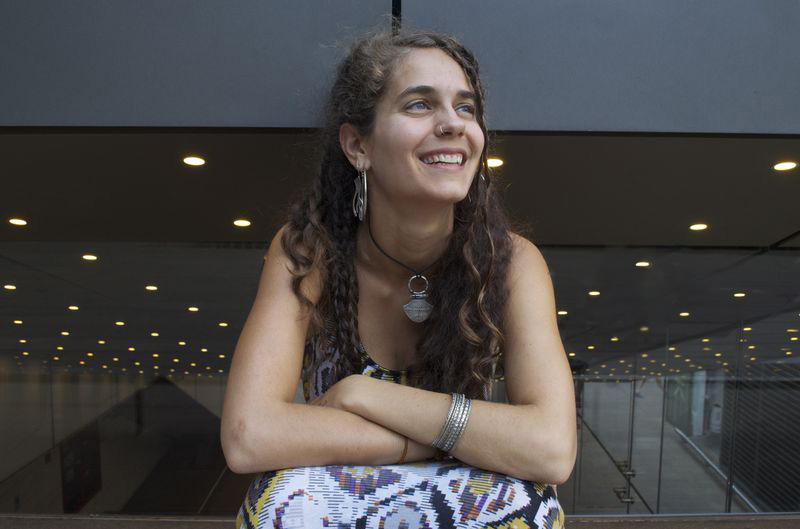
Noelle Ghoussaini, 28, playwright
Hometown: Born in Michigan. Moved to Germany at age 10
Current neighborhood: Crown Heights
Education: B.A. Northwestern University, M.A. Arts Politics NYU Tisch School of the Arts
Moved to Brooklyn: By way of Chicago in 2007
Her hustle: Playwright, director, arts educator
Catch her: Dancing at Franklin Park on Saturday nights; attending Celebrate Brooklyn concerts; food shopping at Grand Army Plaza Green Market on Saturday mornings.
These days, when being a well-off young person is almost seen as a taboo, it’s refreshing that Noelle Ghoussaini isn’t afraid to talk about privilege.
“I’m privileged in many ways, not just financially. I’m privileged racially — I’m Lebanese-American, but I’ve rarely experienced any racial prejudice. I’m privileged in the sense that my parents are still together, and they emotionally support me in everything I do.”
Unlike Girls’ Hannah scribbling essays in her underwear on her day off from the coffee shop, Noelle teaches art in NYC schools to under-served kids. In her plays, Ghoussaini investigates social justice issues and creates characters that give voice to those under-represented. The play Ruth and the Great Gust of Wind she wrote and directed tells the story of historical figure Ruth Reynolds, an activist in the Puerto Rican independence movement, who is also Ghoussaini’s distant family member. Another play she directed, Girls! Girls? Girls., written by Marjuan Canady, has nothing to do with the HBO show; instead, its one woman cast acts out 10 different black female characters in a satirical exploration of identity and stereotype.
She’s aware that she’s a gentrifier in Crown Heights, but she strives to integrate herself in the neighborhood. For instance, she staged a free performance of her play The Wall: A Story of the Land, a science-fiction piece that explores the concept of division in communities, in the Westbrook Community Garden on her block.
“It’s a long process, and I’m not there yet,” she says of immersing herself in the community.
She’s also involved in the Laundromat Project, an NYC organization that hosts art events in laundromats. Tagline: “Wash Clothes, Make Art, Build Community.”
Up next: Her current project in the public space, A Skate Play, was first performed in July in McCarren Park, incorporating skateboarders and skaters as actors to tell a story of flight.
Brooklyn women she admires: Performer Lachrisha Brown, freelance producer Esther Chang, actress, artist and educator Shela Marie.
Her advice to up-and-coming Brooklyn women: “Find collaborators you love working with. Work with people who want to work with you. Build and sustain community. Think outside the box in terms of venues, funding and making new work.”
_________________

Ariel Dearie, 30, super florist
Hometown: New Orleans, La
Current neighborhood: South Williamsburg
Education: B.B.A., Bachelor of Business Administration, Loyola University
Moved to Brooklyn: first in 2006 from New Orleans, again in 2008
Her hustle: Owner, Ariel Dearie Flowers
Catch her: Going out to dinner at favorite spots Five Leaves and Diner; attending free movie screenings at Brooklyn Bridge Park; going on bike rides
Ariel Dearie was already planning a move to Brooklyn when Hurricane Katrina shut down New Orleans, so her plans got fast tracked. She was looking into opening a bakery while working as a manager at Five Leaves. But she started doing flower arrangements for the restaurant and got good enough at it that flowers replaced baked goods in her plans.
“It’s easy here,” she says. “The city is set up for business. You can get the idea and then literally get started the next day.”
She launched Ariel Dearie Flowers in spring 2011, getting the business off the ground with her down-to-earth personality more so than any Twitter buzz. Her arrangements combine a delicate touch with an instinct for leaving just enough free for a natural, freshly-gathered appearance.
Dearie was featured on The Cut as one of Brooklyn’s emerging group of floral designers who also have great personal style; when asked to describe her look, Dearie called it: “feminine, romantic and classic.” DesignSponge did a story on her South Williamsburg apartment, a well-lived-in,well-lighted space filled with antiques and collectibles from New Orleans and her travels.
Dearie’s unique aesthetic has landed her gigs in the fashion world via floral styling, including a Vogue July 2013 cover story with Katy Perry photographed by Annie Liebowitz, a Bulgari ad of Isabella Rossellini (also photographed by Liebowitz), and the Prada store for Fashion’s Night Out.
This spring, she launched bath and body line Royal Botanicals, a homemade botanical bath soak offered in three flavors: Vetiver, Original and Rose Geranium.
Up next: She plans to explore the potential of her new studio space near the Navy Yard, maybe hosting occasional pop-up flower shops or events.
Real Brooklyn women she admires: Graphic designer Marin Dearie (her sister), fashion designer Alexandra Grecco, illustrator KT Smail
Her advice to up-and-coming Brooklyn women: “Find something you love to do. Then, even if you have to work six or seven days a week, it’s not so bad.”
Follow Kate @yatinbrooklyn for more stories of real Brooklyn girls
7 Comments
Leave a Reply



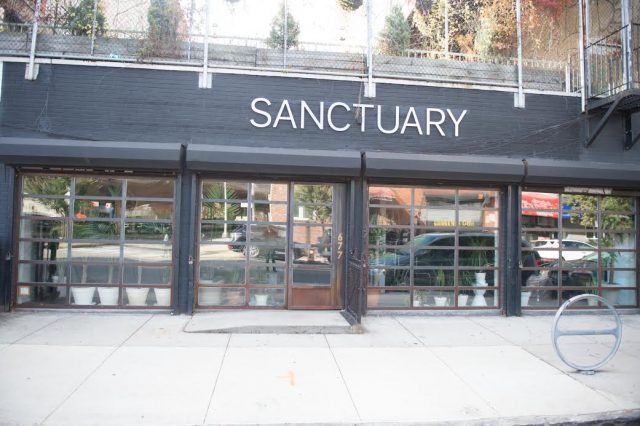
Really inspiring. Thanks for highlighting such dedicated, smart, and badass women!
And now, let’s all go to Champs.
Apparently 28 is the magic number! Noted.
And speaking of magic, yes, Champs is in order…I have always been in awe of that place for being run completely by young, female, awesome-looking magical fairies.
I feel so sad, no one in this article has had a real job.
These women PERFECTLY fit the stereotypes. No real jobs, no children, tattoos, stupid Caucasian dreadlocks, selling garbage to others just like them.
Managing a restaurant isn’t a real job? Business owner isn’t a real job? Outreach coordinator for an author is not a real job?
One out of five has visible tattoos.
How would you know if any of them has children?
Ignorant and hateful.
I think people just get a bit annoyed when someone is says, “look at these five girls, they’re doing great things! Aren’t they doing such a great job?!” and then you scope them out and none of them are really doing anything special. I mean, hey, no one is throwing me a gold medal (or a Brokelyn article) for not living in Williamsburg and taking my job seriously.